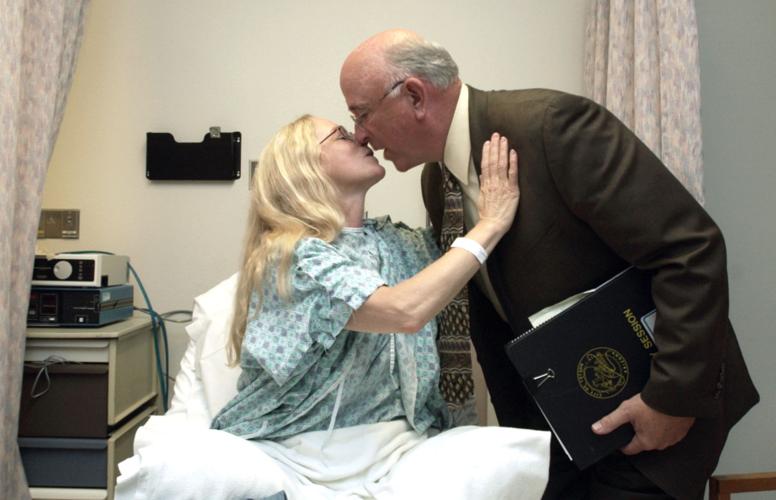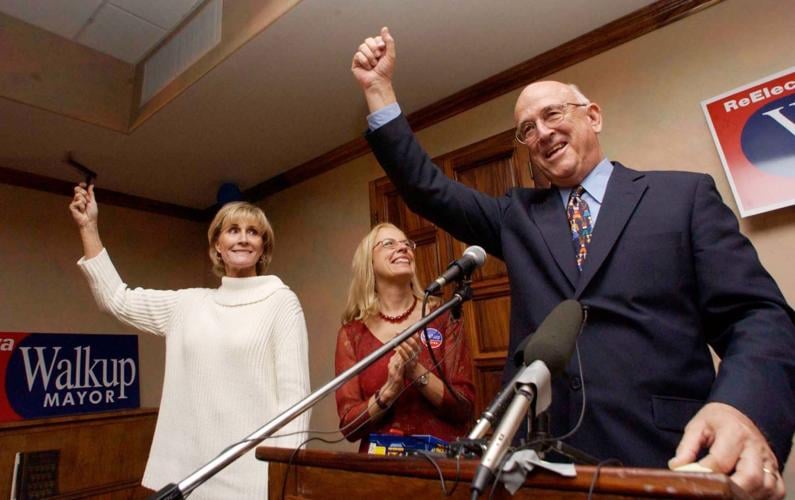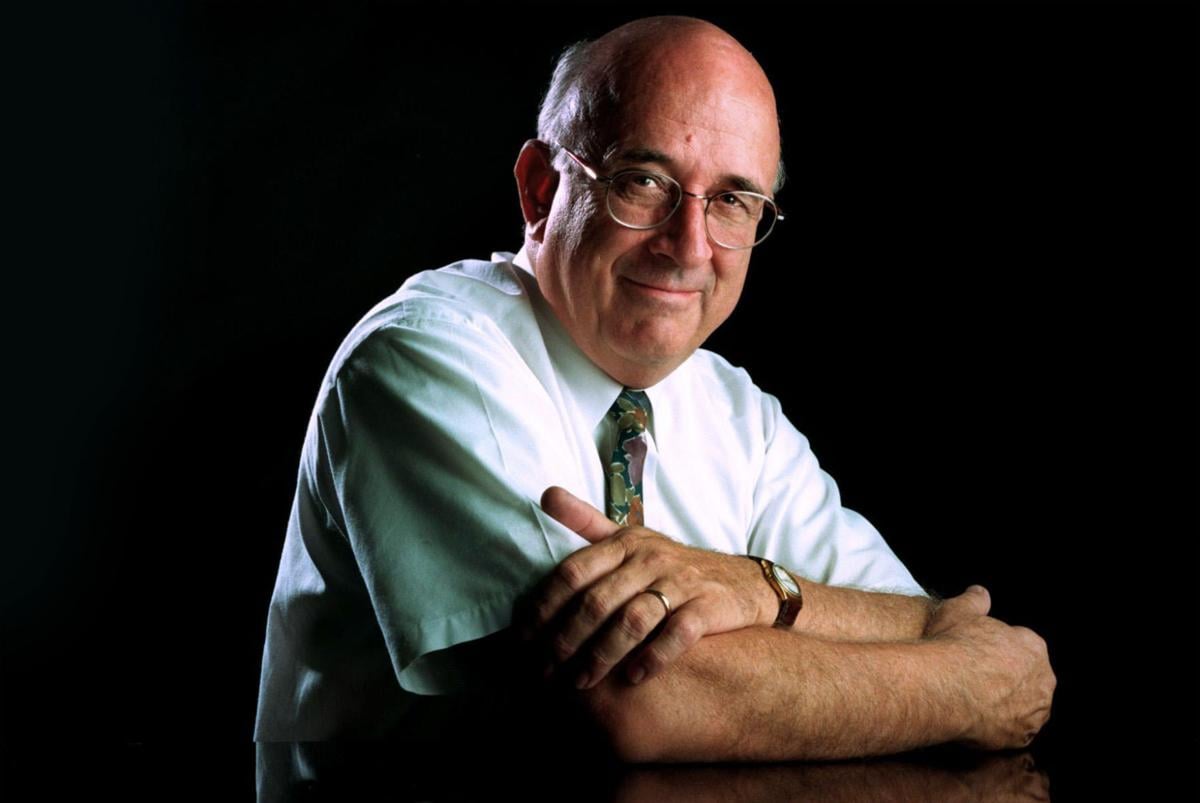Bob Walkup, Tucson’s 40th mayor who ran as a centrist Republican and was elected for three terms serving from 1999 to 2011, died Friday night. He was 84.
Walkup was in hospice at his midtown home, diagnosed with a rare genetic form of idiopathic pulmonary fibrosis, said his wife Beth Walkup.
The lung disease causes scar tissue to grow inside the lungs and makes it hard to breathe. It progresses over time. “We both decided that when he died he would donate his lungs for medical research,” Beth said.
His wife of more than 30 years said she was holding Bob, and other family members were also at his side. “I will always remember him as a kind and generous man. He had a great sense of humor and it showed up from the time he was about 5. He has friends all around the world,” said Beth, explaining they both traveled together and separately before they were married.
Close friend Dennis D. Embry said he met Bob when they served on the board of the Children’s Museum Tucson and both “worked together then to make an exhibit out of nothing, and I could tell that Bob’s eye was on our new director, Beth LaRouche. That bloomed into romance and a wedding, where I walked Beth down the aisle,” recalled Embry. “In the end, it was being with him on his last day as his engineer mind calculated the when. Both he and I knew from the numbers, and I kissed him as a brother spirit,” said Embry of the moments before Walkup passed.
“I am very, very sad,” said Mayor Regina Romero when she heard of the news. She said Walkup and her would text often but could not get together because of the coronavirus. “I met Mayor Walkup before I got elected to the Tucson City Council. He always was a statesman and always was respectful and always had something good to say as he saw me grow and mature as an elected official. He wanted the best for the city. He worked across the aisle to get things done. He saw past parties,” she said.
Romero said Walkup was instrumental in the city receiving a $63 million federal transportation grant to build the city’s streetcar. “He went many times to Washington, D.C., to meet with the federal transportation administration, and he worked closely with Congressman Raúl Grijalva and (then) Congresswoman Gabrielle Giffords. He knew that we would see infrastructure investment, job creations and a renewed downtown,” said Romero.
Councilwoman Karin Uhlich said of Walkup: “While we agreed and disagreed throughout our service together, we have also developed a friendship built on mutual respect and affection. He has such a kind and compassionate heart; his care for Tucson and others so genuine.”
“I know our entire community sends Bob and his dear wife Beth best wishes, gratitude and love. He’s a Tucson treasure and a man who has served us well,” said Uhlich, recalling Walkup’s work in the cross-jurisdictional collaboration in “the formation of the library district to preserving Rio Nuevo in hostile political terrain as we worked together to develop the right oversight, policies and partnerships to make it a success.”
In an interview with the Arizona Daily Star before leaving office, Walkup said he was “content” because he believed he did a good job and Tucson was better for it, despite critics who said he left unfixed the controversy which plagued Rio Nuevo downtown development efforts that led to millions of dollars lost to planning and designs of projects that never came to fruition. Walkup said: “It’s a bit of the cost of doing business.”
Under downtown development plans, Walkup said he helped connect the west side of Interstate 10 to the rest of downtown and set the stage for the modern streetcar. A landfill was cleaned up and infrastructure built. The university established a presence downtown, and some corporate headquarters moved in. He predicted that someday people will come downtown and be struck by all the activity taking place.
“Bob was dedicated to economic development downtown and its rebirth,” said Steve Leal, a former member of the Tucson City Council who served when Walkup was mayor. “He cared a lot about Rio Nuevo and the streetcar, and it generally made him happy to see good things happening downtown,” said Leal.
“Bob was not only easy to work with, he was ready to work,” said Leal, who served five council terms. “He cared about the community and he liked to brainstorm with people and figure things out. He liked teamwork for creative problem-solving. I trusted him and enjoyed working with him.”
Former Mayor Jonathan Rothschild recalled Walkup’s character. “I have met a whole lot of people in my life and you will never meet a nicer person than Bob Walkup. He didn’t have a bitter bone in his body. He always treated me graciously and he was willing to help me,” said Rothschild, who was elected to fill the mayoral seat left open by Walkup who chose not to run for a fourth term.
Rothschild said Walkup’s legacy is his work in the creation of a Regional Transportation Authority and tackling the Central Arizona Project water delivery system to Tucson. He also said Walkup’s vision and work on Rio Nuevo and the streetcar “took time to blossom.”
“The underlying roots were in good part for Bob’s vision of downtown, and it reached success later on,” said Rothschild.

Tucson Mayor Bob Walkup, center, introduces Sonora Gov. Guillermo Padres Elias, left, to attendees at a 2011 event at Hacienda del Sol Resort. Jonathan Rothschild, who was then mayor-elect, is at right.
Transit, water big accomplishments
Walkup was mayor on Jan. 8, 2011, when Giffords was holding an event at a northwest-side shopping center and a gunman killed six and wounded 13, including Giffords. He said the nation and the world saw the best of Tucson in the wake of the shootings with first responders and medical teams performing “modern miracles,” and the community uniting with candlelight vigils, memorials and raising funds to support the victims.
“They saw new heroes emerge at the scene of unspeakable tragedy. Indeed, they saw Tucson. One troubled man at his worst and one million of us at our best,” said Walkup in a Star article.
Walkup was known for his involvement in securing federal funding for the streetcar project. The streetcar system was the first made in America in nearly 60 years and is the city’s first all-electric, fixed-rail transit system. It is part of the voter-approved $2.1 billion RTA plan implemented through 2026.
Walkup was present at festivities in July 2014 at its launch. The 4-mile streetcar route connects five districts — the University of Arizona, Main Gate Square, Fourth Avenue, Downtown and the Mercado, west of the Santa Cruz River. There are 100,000 people who live, work and spend leisure time within a quarter-mile of the corridor, according to city data.
Walkup also was known for his work on water issues, and under his leadership in 2001 the city began using its share of Colorado River water. It supplemented the potable water supply and reduced Tucson’s dependence on groundwater.
He had backing from business leaders, developers, homebuilders and contractors because the Colorado River water helped provide a long-term water policy needed for future growth. However, the city had to deal with its program of blending the river water with the groundwater to reduce salinity and mineral levels, making the drinking water taste better and household appliances operate longer. In the 1990s when the river water was first delivered, it corroded homeowners’ pipes, causing devastation to properties.
The former mayor collaborated with the county and planned the consolidations of economic development agencies into one regional entity — Tucson Regional Economic Opportunities Inc., which formed in 2005.
The nonprofit consortium, now known as Sun Corridor Inc., consists of private, public, academic and nonprofits to promote jobs and business assistance in Southern Arizona. Industry targets are aerospace and defense, bioscience, transportation and logistics, and renewable and mining technology.
Walkup was the first Arizona mayor to sign the U.S. Mayor’s Climate Protection Agreement, and his environmental efforts resulted in doubling the city’s recycling rate, instituting impact fees to make new growth pay its fair share and requiring Leadership in Energy and Environmental Design, or LEED, certification on new city buildings. He also led the way on expansion of the city’s solar energy capability.

Bob Walkup celebrates with his wife Beth, and Patti Noland, far left, as he announces his victory in the mayoral election at the Manning House on November 4, 2003.
Being mayor a “great joy”
During his 12th State of the City address and his last 10 years ago, Walkup said it was a “great joy” to be mayor, “but now Beth and I need to take care of our families and each other,” according to a Star article. The couple had five children, six grandchildren and numerous other children that called them Grandpa and Grandma, said Beth.
He enjoyed making grandfather clocks, playing guitar, sketching, studying astronomy and restoring antique cars and motorcycles. In a column written by Star cartoonist David Fitzsimmons in November 2020, “Fitz” told Walkup that he thought his greatest accomplishment was “rebuilding a ’77 VW surfer van to cherry perfection.”
Walkup laughed.
Walkup was born Nov. 14, 1936, and was raised in Ames, Iowa, where his father was a professor of engineering at Iowa State University. After Walkup received an industrial engineering degree from that university, he served in the Army Corps of Engineers.
Once he completed his service, Walkup worked over three decades in the aerospace industry.

Mayor Bob Walkup kissed his wife, Beth, at Tucson Medical Center as she prepared to have surgery for breast cancer in 2002. The couple had five children and six grandchildren.
He worked at Rockwell International, Fairchild Republic where he oversaw the production of the A-10 and Hughes Aircraft Co. — which became Raytheon — building avionics equipment, military and commercial aircraft and other national defense systems.
Walkup was a volunteer for years at the Tucson Community Food Bank, which is now the Community Food Bank of Southern Arizona; the Pima-Santa Cruz County School-to-Work Program; and the Arizona Space Commission.
He also was a former president of the Arizona League of Cities and Towns. He served on the Pima Association of Governments Regional Council, the Regional Transportation Authority Governing Board, and the Tucson Regional Economic Opportunities Board.
Services will be announced at a later date.








